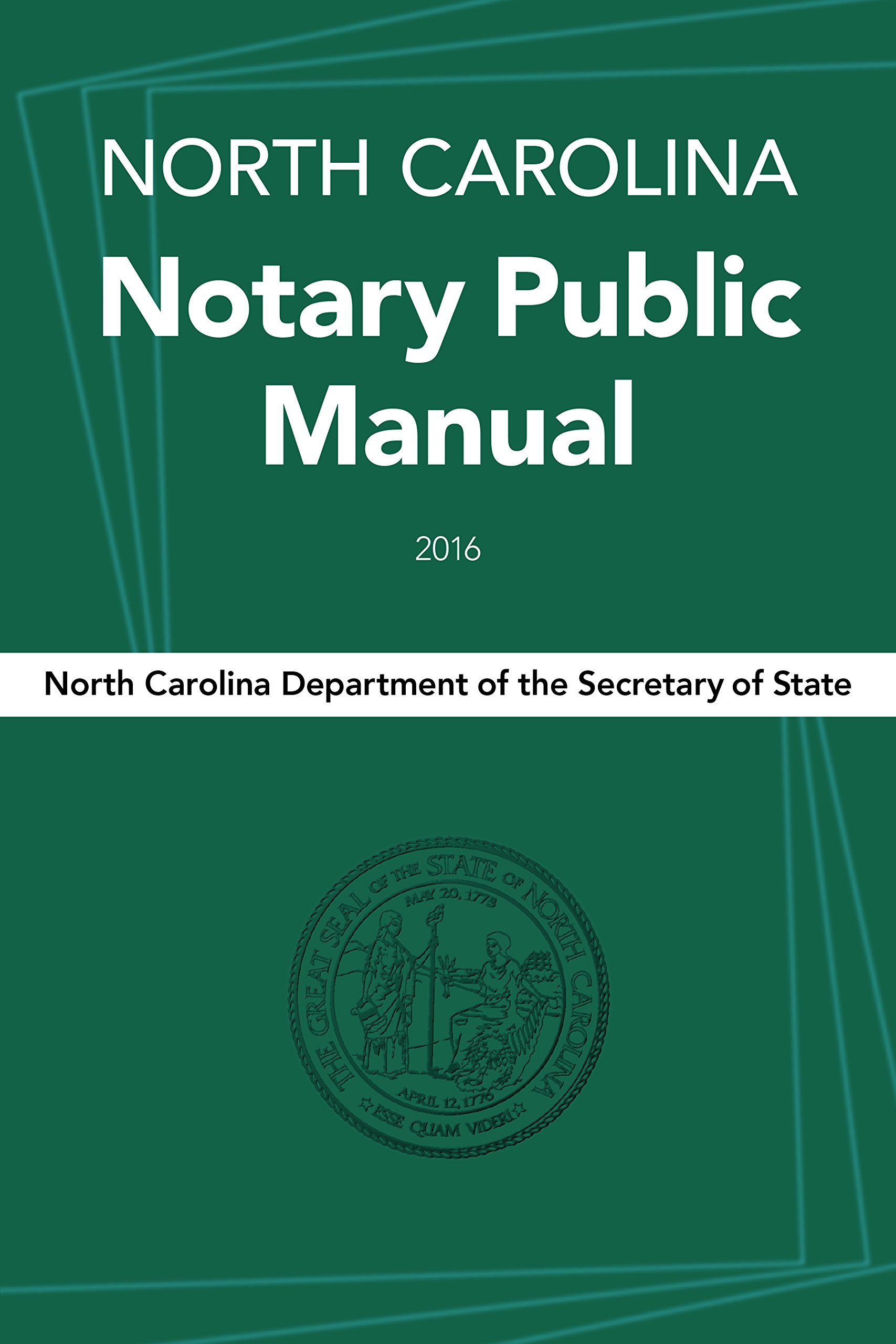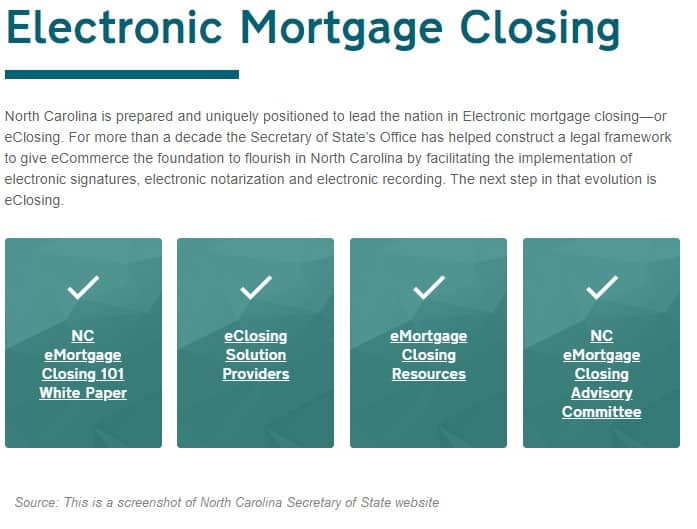(**) Disclosure: This post may contain affiliate links, meaning RealEstateCareerHQ.com will get a commission if you decide to make a purchase through the links, but at no additional cost to you.
To become a notary loan signing agent in North Carolina, an applicant must meet the state-eligibility requirement, complete the notary course, pass the exam, submit a notary public application to a North Carolina Secretary of State’s office, pay the application fee, take an oath of office and purchase the notary seal and journal.
Although you could work on different types of documents, the loan signing business in the real estate market seems to be a lucrative niche.
So what does a loan signing agent do? When people are getting a mortgage to purchase a house, or they need to refinance their property, there will be loan documents involved. Your role as a notary loan signing agent is to walk through the set of loan documents with the borrower and witness them in signing the paperwork.
You would also need to verify the identity of the signers, place the notary stamp on the signed documents, then send them back to the signing services company or closing attorney.
But keep in mind that you should NOT be providing legal advice, and you cannot explain the terms of the loan documents to the borrower.
In this guide, you’ll learn the steps to become a notary signing agent in North Carolina, income updates, and FAQ about this profession.
But before we start, I want to give a brief disclaimer. This post is not intended as legal advice or state/federal notary public training. It is for general information only. Please check with your state to be sure that loan signing agents are utilized in the closing process. Always follow your state’s notary laws and best practices.
Would you like to learn how to make $75 to $200 per signing appointment? You must check out the Loan Signing System from Mark Wills. (**) This is one of the best training programs for loan signing agents. Many students have achieved remarkable business success after taking this program.
8 Steps to Become a Notary Signing Agent in North Carolina

Step 1: Meet the state-eligibility requirement
- At least 18 years of age or legally emancipated by the court
- Legally reside in the United State
- Reside or have a regular place of work/business in North Carolina
- Have a high school diploma or equivalent (i.e.: GED)
- Able to read and write English
Step 2: Purchase the North Carolina Notary Public Manual

Image linked from Amazon
This is an official manual prepared by the North Carolina Department of the Secretary of State and one of the requirements stated on the Notary Application.
In there, you will learn about best practices, tips, practical instructions, and essential tools in being an NC notary.
At the time I’m writing this post, the most updated version is the 2016 edition. Although you may find the manual in local bookstores, community colleges, UNC School of Government bookstore, to make it easier for you, here is a link from Amazon where you can make the purchase. (**)
Step 3: Take a notary public course
As a professional notary signing agent, you must know the proper procedure of notarization, what actions are prohibited, and the best practices in this profession.
To ensure that you are well-prepared, you must take a 6-hour course at a local community college. It will be either on a full-day or two days schedule. You must have a valid identification proof to apply.
I am currently reading the website of a course provider. Their course tuition is $160, and this is a one-day program. Also, some colleges may provide you with the Notary Public Manual. If that is the case, then you don’t need to purchase it separately.
Step 4: Pass the notary public exam
At the end of the course, you are required to write an exam. The purpose is to test your notary knowledge, especially the subjects that are covered in the class and Notary Public Manual.
Is the North Carolina notary test hard?
Some people comment that NC has one of the most stringent requirements in becoming a notary. The required passing score of the test is 80%.
You can take the NC exam three times in 30 days. But if you fail them all, you will have to retake the Notary Public course. Then I believe you would need to pay the tuition again.
Doing sets of practice questions is an excellent way to prepare for the exam and boost your confidence. Here is an exam prep I found on Amazon, which contains 200 questions and 2 practice exams. (**)
Step 5: Submit a notary application to the North Carolina Secretary of State
Within three months of notary class completion, you must mail the application to the Department of the Secretary of State.
There are several ways to obtain the form. You can get it from your course instructor, at the register of deeds office, or from the SOS website. Here is the link to download the application.
Although the questions are pretty straightforward (i.e., your name, business address, background info), you must ensure you complete them accurately. If there are blank spaces, they will decline your application, and you also need to re-submit a new fee!
The application fee is $50. You may make the check or money order payable to NC Secretary of State.
Furthermore, the course instructor must sign the form. But you should NOT do that at the class because you need to sign it in front of a notary public who will notarize your signature.
If you are a non-US citizen, you must also submit proof of legal residence – for example, work visa, permanent resident card.
Once all the required documents are ready, you mail it to:
- Notary Public Section, Department of the Secretary of State, PO Box 29626, Raleigh, NC 27626-0626
Step 6: Take an oath of office

The office will process your application within 72 hours of receipt. Once they approve your application, within two weeks, they will send you the Notary Oath Notification Letter either by mail or email. Sometimes, the email could fall into a junk folder by accident, so be sure to keep an eye on it.
Within 45 days, you must visit the Register of Deeds Office in the county where you reside and take an oath. An oath of office is an affirmation that you agree to assume the duties of a notary public and that you will comply with the rules and laws.
Keep in mind to bring proof of identification. There will be a $10 fee.
Then the office will provide you with the Notary Certificate right at the spot. It is better to review and make sure all the details are correct on the Notary Commission Certificate. (e.g., your name, county of residence, commission dates).
Step 7: Get a notary seal

According to North Carolina General Statutes 10B-37, notary is required to use an official stamp or steal to authenticate all notarial acts. Having one helps you to include specific info in every document so that you won’t leave out any required details.
However, make sure its design comply with the regulatory rules.
§ 10B-37. Seal image.
(a) A notary shall affix the notary’s official seal near the notary’s official signature on the notarial certificate of a record.
(b) A notary’s official seal shall include all of the following elements:
(1) The notary’s name exactly as commissioned.
(2) The words “Notary Public”.
(3) The county of commissioning, including the word “County” or the
abbreviation “Co.”.
(4) The words “North Carolina” or the abbreviation “N.C.” or “NC”.(c) The notary seal may be either circular or rectangular in shape. Upon receiving a commission or a recommission on or after October 1, 2006, a notary shall not use a circular seal that is less than 1 1/2 inches, nor more than 2 inches in diameter. The rectangular seal shall not be over 1 inch high and 2 1/2 inches long. The perimeter of the seal shall contain a border that is visible when impressed.
(c1) Alterations to any information contained within the seal as embossed or stamped on the record are prohibited.
(d) A notarial seal, as it appears on a record, may contain the permanently imprinted, handwritten, or typed date the notary’s commission expires.(e) Any reference in the General Statutes to the seal of a notary shall include the stamp of a notary, and any reference to the stamp of a notary shall include the seal of the notary.
(f) The failure of a notarial seal to comply with the requirements of this section shall not affect the sufficiency, validity, or enforceability of the notarial certificate, but shall constitute a violation of the notary’s duties. (2005-391, s. 4; 2006-59, s. 17; 2013-204, s. 1.2.)
Quote from § 10B-37. Seal image
You may purchase the notary seal from office supplies store. Also, you must keep the notary seal in a locked and secured area, where only you have direct and exclusive control of it. (e.g. a locked drawer or cabinet.)
Step 8: Maintain a notary journal

As a notary signing agent in North Carolina, maintaining a good record of your notary acts is an important part of good business practice. It could serve as proof that you have taken reasonable steps to identify the signer of a document.
It is better to have a permanently bounded journal with numbered pages. You may find it at stationery, office supply stores.
Below are the items you should record in the notary journal.
- Date and time of notary act;
- Type of act;
- Title of document;
- Signature, printed name and address of each signer, and if applicable, each witness;
- Form of identification document;
- Amount of fees collected
Here’s a sample of the notary journal from the NC Secretary of State.
Here’s a video on how to become a notary in North Carolina
Here’s a Snippet of What Stephanie Espinal Think about Being a Notary Signing Agent!

“My advice is that don’t be afraid to start the loan signing career on a part-time basis. I would also tell them that they need to be passionate about the profession and not just because of the money. They must dedicate their time to learning the business and notarial laws from your state.
You will be working with people’s financial lives and any mistake you make with cause them a lot of money.”
– Stephanie Espinal, Notary Loan Signing Agent
Here’s an exclusive interview with Stephanie. In there, she shared what it takes to be a notary signing agent as a side gig, her valuable journey, and secret sauce to success.
How do you become an electronic notary in NC?
One thing I really like about this industry in North Carolina is the option for notary to work digitally. Doing so could bring you great convenience to streamline your notary practice.
Electronic notarization (or e-notary) allows you to notarize an electronic document using an electronic signature and electronic seal.
However, I must emphasize that e-notarization is different from Remote Online Notarization (RON). E-notarization still requires you to meet the signer face-to-face, but not for RON.
Here are the steps to become an eNotary in North Carolina:

Step 1: Complete an eNotary course
This is a 3-hour course that covers procedures required to exercise electronic notarial acts. You need to take it from a local community college.
Once again, there will be an exam at the end of the class. You must obtain at least 80% to pass the exam.
As I’m checking with one of the course providers’ website, the tuition is $75. Their class would cover the following topics:
- Legislative History
- Eligibility and Registration
- The Notary Public Act – A Broad Review
- Elements of an Electronic Notarization
- Performing an Electronic Notarization
- Electronic Notarization System Solutions
- Security Standards
- Electronic Notary Solution Providers
- Ethics
- Consequence of Misconduct
- Best Practices and Recommendations
Step 2: Choose an electronic solution provider

Since this is online notarization, you need a technology platform to perform such notarial acts. However, since there could confidential information involved, you must choose a vendor with a high-level of security and meeting the Secretary’s requirements.
Below is the list of approved technology vendors I’m seeing on the NC Secretary of State website.
Step 3: Register with the NC Secretary of State
Similar to the initial notary application process, you need to register with the NC Secretary of State. Here is the link to the eNotary Registration. However, you must be an existing notary public before you can register as an eNotary.
You would print out and sign the registration form in front of another notary public. (You cannot notarize your own signature.). Then send it to the Department of Secretary of State along with the $50 registration fee.
Once the Department approves your application, they will notify you to take an oath at the Register of Deeds Office. You must do so with 45 days. In there, you will be provided with the Electronic Notary Certificate.
You will need this certificate to an approved technology vendor to obtain an electronic notary signature and seal.
Does North Carolina allow remote notarization?

Remote online notarization allows you not to be physically present with the signer. Instead, you would verify their the signer’s identity through video and audio conference.
At the time I’m writing the post, there are emergency rules imposed allows remote notarization in North Carolina.
However, this could be a temporary measure. Whether they would revert to in-person notarization afterward is unknown yet. Therefore, you should check with the Secretary of State.
Familiarize yourself with the rules and best practices of RON
A good resource to learn about video notarization is by watching the training below. This is prepared by the NC Department of the Secretary of State, and the entire training is about 1 hour long.
It is essential to read over the contents on the Emergency Video Notarization page. In there, you will find the requirements, FAQ, and notary journal template for remote notarization.
If you are interested in being a loan signing agent, there are many helpful contents about electronic mortgage closing on the Secretary of State website.

I found the white paper especially interesting. It is a 35 pages guide that discusses the benefits of eClosing, how to transition eClosings for each stakeholder group, its legal framework, future issues, and contingency plans.
How much do notary loan signing agents make in North Carolina?

The average annual income of Loan Signing Agents in North Carolina is $37,974. The income typically ranges between $24,133 to $49,071. Top earning loan signing agents in North Carolina are making over $73,204.
As a notary, you could work on different documents, but the loan signing in the real estate market could be a lucrative niche.
Top 10 Highest Paying Cities for Loan Signing Agents in North Carolina
| City | Annual Salary |
|---|---|
| Raleigh | $54,139 |
| Concord | $50,862 |
| Charlotte | $49,644 |
| Cary | $48,253 |
| High Point | $47,803 |
| Asheville | $47,775 |
| Durham | $45,991 |
| Greenville | $44,098 |
| Winston-Salem | $44,089 |
| Greensboro | $43,108 |
source: ZipRecruiter (March 13, 2022)
Can you make over $10,000/month as a loan signing agent? Be sure to check out our notary earning guide. You’ll find a case study where a loan signing agent has built her business to such a successful figure.
Is there demand for notary loan signing agent in North Carolina?
As long as people are obtaining mortgages or refinancing their homes, there would be a demand for loan signing agents.
All originated mortgages in North Carolina
| YEAR | All originated mortgages |
|---|---|
| 2017 | 240,128 |
| 2016 | 262,765 |
| 2015 | 231,114 |
| 2014 | 192,473 |
| 2013 | 278,062 |
| 2012 | 289,407 |
| 2011 | 227,079 |
| 2010 | 248,590 |
| 2009 | 303,410 |
| 2008 | 260,693 |
| 2007 | 337,640 |
Source: Consumer Financial Protection Bureau – Home Mortgage Disclosure Act (HMDA) (July 30, 2020)
Some states are “Attorney States,” which means only attorneys can coordinate the closing paperwork. Whereas, others are “Escrow States” where escrow companies would handle the mortgage closing.
According to the First American Title, either attorney or title companies can perform the closing in North Carolina. Here is a post that talks more about the differences escrow states and attorney states. And how would it impact your loan signing business?
If you want to succeed in the loan signing industry, you must check out this loan system training program. If you review the testimonials of his students, you’ll be amazed at how the notary career changes their life after they learned from Mark Wills. (**)
How much does it cost to become a notary in North Carolina?

It would cost approximately $402 to become a notary in North Carolina.
Here’s a breakdown of the costs to start a notary signing business
| Notary Application | $50 |
| Notary Public Manual | $25 |
| Notary Public Course | $160 |
| Oath of Office Filing fee | $10 |
| Notary Stamp | $17 |
| Journal | $15 |
| eNotary Application | $50 |
| eNotary Course | $75 |
There could be other expenses involved such as E&O, travel expenses, car maintenance, auto insurance, remote notary technology, laptop and other business supplies.
Can a felon be a notary signing agent in North Carolina?

Having a conviction for a felony may impact the application to become a notary signing agent in North Carolina. The Secretary of State needs to make sure that you are a person with credibility, truthfulness, and integrity to fulfill the responsibilities of the position.
The Office reserves the right to conduct a criminal background check on applicants. Depending on the severity and nature of the conviction, the North Carolina Secretary of State would review it on a case-by-case basis.
Below are some reasons a commission may be denied:
- Convicted of a felony in NC or another state
- Convicted of corruption or malpractice
- Removed from any office by impeachment
In the notary application, there are questions:
Have you ever been convicted by any court of a felony or misdemeanor? Have you been charged with an offense for which trial is still pending?
Have you ever had a professional license or notary commission denied, revoked, restricted or suspended? Have you ever had to resign a license or commission under unfavorable circumstances?
Quote from Application for Initial Appointment as a North Carolina Notary Public
If you answered “yes” to any of the above, you need to obtain a Certificate of Moral from three individuals. Simply speaking, these references are used to prove that you are a trustworthy person to act as a notary.
How long does it take to become a notary signing agent in North Carolina?

You could finish the notary course in a day or two. After the NC Secretary of State receives your application, they will process it within 72 hours and notify you in the next two weeks. Then it would depend on how long you are going to take an oath of office. But you must do so within the next 45 days.
Assuming the entire process goes smoothly, it would take approximately three weeks to become a notary signing agent in North Carolina.
How long is a notary commission good for in North Carolina?
The notary commission in North Carolina is good for the term of five years.
To renew your NC notary commission, you must pass an online notary exam. The required passing score is at least 80%. The renewal can be done by completing the Application for Reappointment. There is a $50 fee.
To avoid an interrupted business period, begin the renewal process in advance. But you can only apply for reappointment within 10 weeks before your commission expires.
So just don’t wait till your current notary commission is expired.
Can I notarize for a family member in North Carolina?

You must not notarize any documents where you have any financial or beneficial interest in the transaction. Therefore, notarizing a document for any family member could call into question, and such practice should be avoided.
I have more questions about being a notary signing agent in North Carolina, where could I obtain more details?
You may contact the North Carolina Secretary of State, the Notary Public Section:
- Post Office Box 29626, Raleigh, North Carolina 27626-0626
- 919-814-5400
- notary@sosnc.gov
If you are reading up to this point, I bet you must be interested in the notary signing profession. But why reinvent the wheel when there is a proven system that works? Many students had great success following the Loan Signing System (LSS) from Mark Wills. You may click here to check it out yourself. (**)
Disclaimer: The information in this post is for general information only, and not intend to provide any advice. They are subjected to change without any notice, and not guaranteed to be error-free. Some of the posts on this site may contain views and opinions from individual not related to JCHQ Publishing. They do not necessarily reflect our view or position.
(**) Affiliate Disclosure: Please note that some of the links above are affiliate links, and at no additional cost to you. Our company, JCHQ Publishing will earn a commission if you decide to make a purchase after clicking on the link. Please understand that we include them based on our experience or the research on these companies or products, and we recommend them because they are helpful and useful, not because of the small commissions we make if you decide to buy something through the links. Please do not spend any money on these products unless you feel you need them or that they will help you achieve your goals.
Reference:
- First American Title- Your Guide to Real Estate Customs by State (source)
- North Carolina Secretary of State – Notary (source)
- Electronic notary FAQ (source)
- Salary.com – Notary Signing Agent Salary in North Carolina (source)
- ZipRecruiter – Loan Signing Agent Salary in North Carolina (source)
- Consumer Financial Protection Bureau – Home Mortgage Disclosure Act (HMDA) (source)
- North Carolina General Assembly
- 10B-37 Seal image (source)
- Central Piedmont Community College – Notary Public (source)

